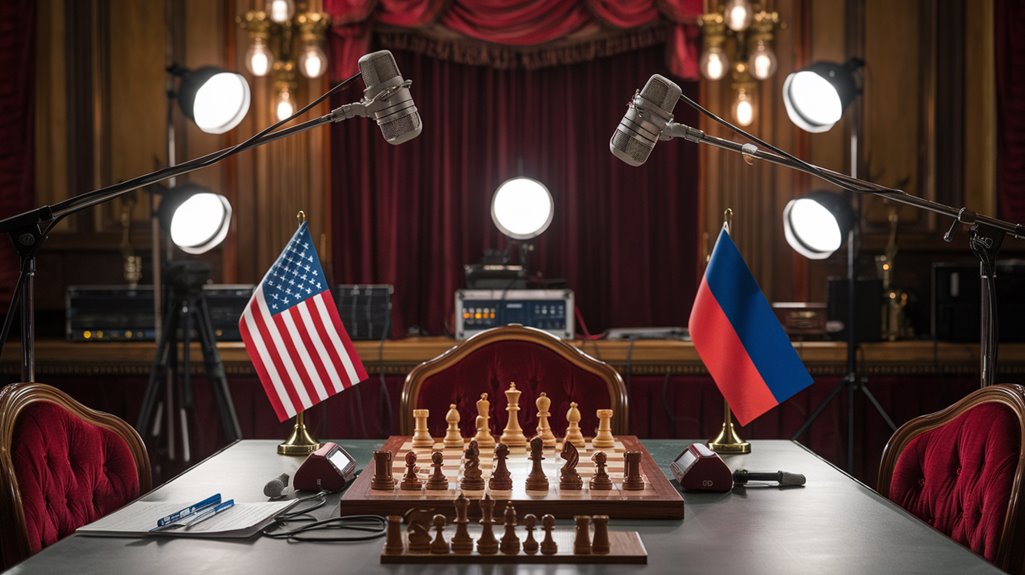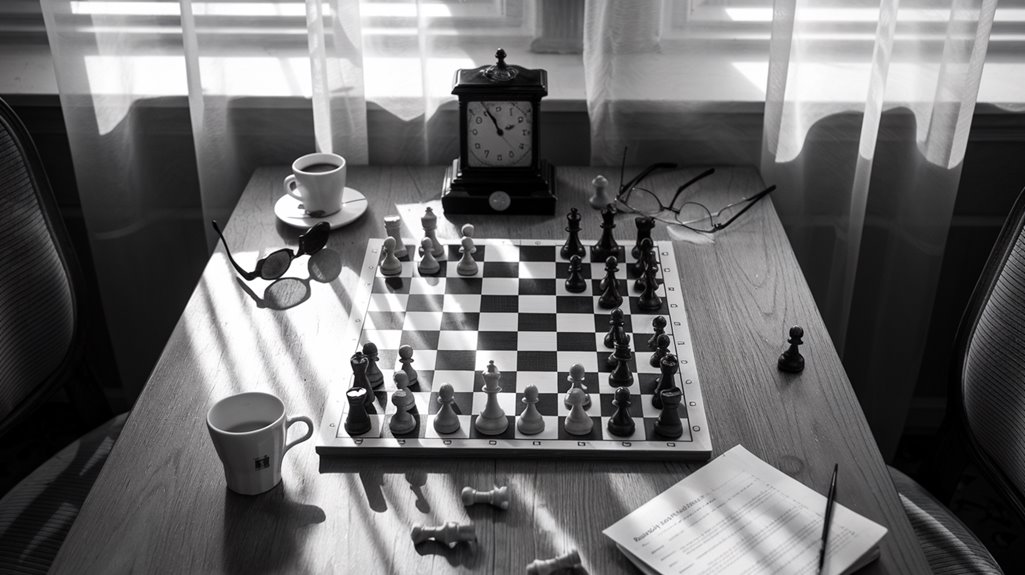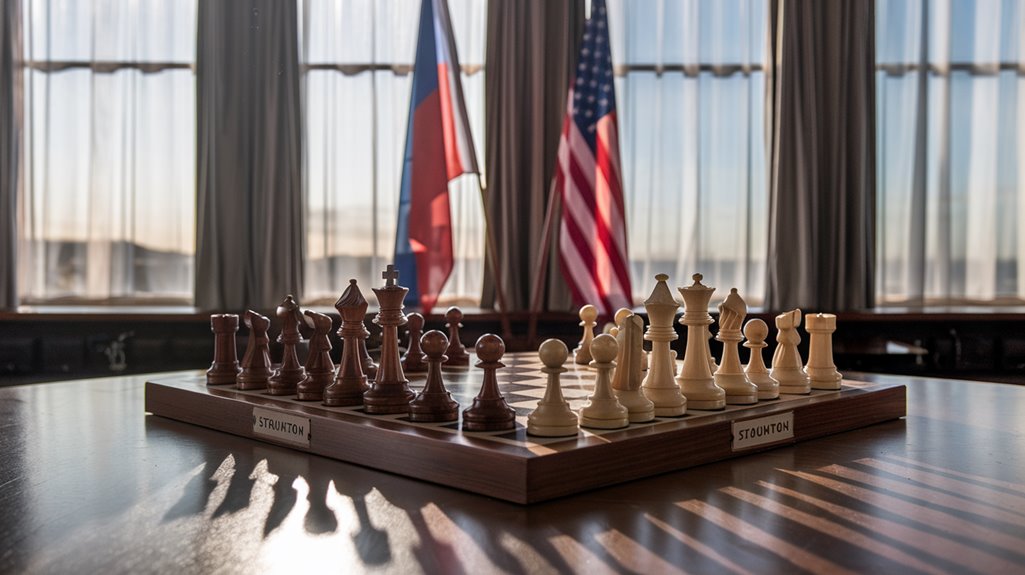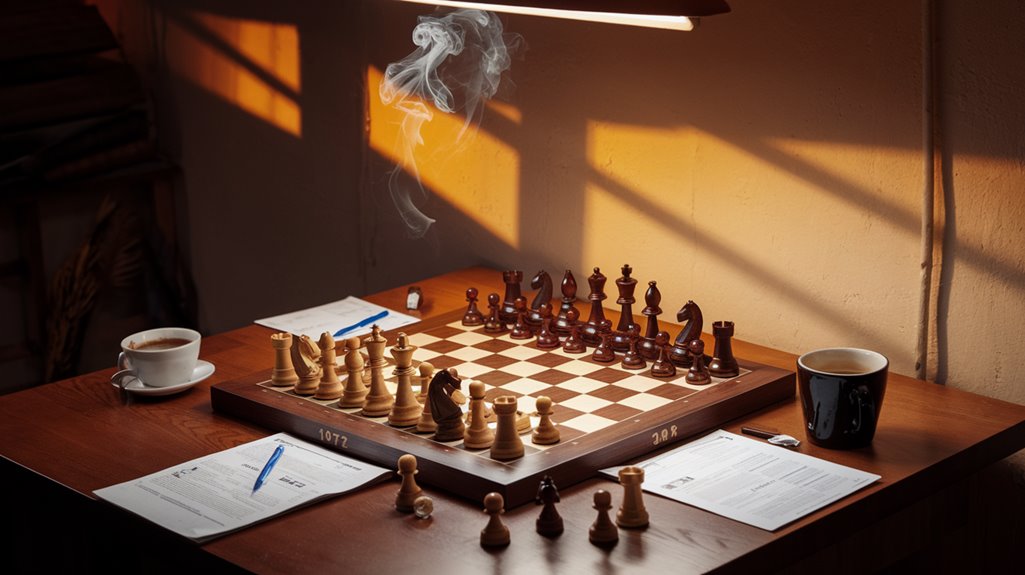Fischer Vs. Spassky and the Cold War: The Chess Match That Sparked a Revolution
You've probably heard about sports matches that changed history, but none quite compare to the 1972 chess showdown between Bobby Fischer and Boris Spassky. In the heat of the Cold War, these two grandmasters turned a chess board into a battlefield where the U.S. and Soviet Union fought for intellectual supremacy. What happened in Reykjavik that summer wasn't just about moving pieces on a board – it sparked a cultural revolution that would transform both the game and global politics forever.
The Cold War Chess Arena: Setting the Stage

While many sporting events have captured the world's attention, few matched the intensity and symbolism of the 1972 World Chess Championship between Bobby Fischer and Boris Spassky.
You'll find that this wasn't just a chess match – it was a Cold War battleground where every move carried strategic significance beyond the board. The superpower rivalry between the United States and Soviet Union transformed this intellectual competition into a clash of ideologies. National pride became increasingly important as both nations viewed the match as a test of their systems. The championship took place in neutral Iceland, providing a perfect backdrop for this ideological showdown.
For decades, the Soviets had dominated chess, using their champions' success to showcase their supposed intellectual superiority. But now, they faced a serious American challenger.
The match's symbolism was unmistakable: two players representing opposing systems, fighting for national pride on a global stage. Each move would echo through the halls of power, making this contest a perfect metaphor for the ideological struggle of the era.
Bobby Fischer's Rise to Chess Stardom
Long before his historic match with Spassky, Bobby Fischer blazed through the chess world as a prodigy who shattered records at every turn. His remarkable achievement of becoming the youngest grandmaster at age 15 solidified his status as a chess phenomenon.
Fischer's genius emerged early, as he claimed the US Championship at just 14 years old and went on to dominate the national chess scene with eight championship victories. His remarkable chess career began when he won the US Junior Championship at age 13, setting the stage for his future dominance.
You'll find his path to greatness marked by these stunning early victories:
- His brilliant play in the 1956 Rosenwald Tournament, where he won the brilliancy prize against Donald Byrne
- Becoming the youngest US Open Champion with an impressive 10/12 score
- Achieving a perfect 11/11 score in the 1963 US Championship
- Crushing the competition at the 1970 Buenos Aires tournament with a remarkable 15/17 score, finishing 3½ points ahead of his closest rival
Boris Spassky: The Soviet Champion's Legacy
Brilliance defined Boris Spassky's ascent to chess supremacy, as he claimed the Soviet Chess Championship in 1961 and went on to become the 10th World Chess Champion in 1969. His classical approach to the game, combined with fierce attacking combinations, made him a formidable opponent on the world stage.
Spassky's strategies showcased a deep understanding of positional play, while his willingness to sacrifice pieces demonstrated his tactical genius. Learning under master Vladimir Zak, he trained intensively for 4-5 hours daily during his youth. You'll find his influence throughout modern chess, as his games continue to be studied for their creative brilliance and strategic depth.
Even after his historic loss to Fischer in 1972, Spassky's resilience shone through as he remained competitive, winning prestigious tournaments in San Juan, Leiden, and Amsterdam. His sportsmanship during the "Match of the Century" and his lasting impact on chess earned him induction into the World Chess Hall of Fame. His defeat marked the end of Soviet chess dominance that had lasted since 1948.
The Battle in Reykjavik: Game-by-Game Analysis
As the 1972 World Chess Championship unfolded in Reykjavik, each game between Fischer and Spassky became a masterclass in strategic warfare.
You'll find that Fischer's tactical maneuvers evolved throughout the match, from his early blunder in Game 1 to his innovative play in Game 3's 11…Nh5 novelty. The unprecedented match created a media sensation, with Fischer emerging as the Einstein of chess. Early tensions arose when Fischer forfeited Game 2 after expressing complaints about cameras.
- Fischer's surprising choice of the Queen's Gambit Declined in Game 6 showcased his versatility and caught Spassky off guard.
- The psychological strategies became evident as Fischer maintained pressure through seven consecutive draws.
- Spassky's critical errors, particularly in Games 6 and 8, revealed the mounting pressure he faced.
- The match reached its climax in Game 21, where Fischer's adoption of the Taimanov Variation secured his historic victory and the world championship title.
Media Frenzy and Global Impact

The Fischer-Spassky match stretched far beyond the confines of their chess battles in Reykjavik, igniting an unprecedented media storm that captivated audiences worldwide.
You couldn't escape the media spectacle as 2,300 spectators flocked to the first game, while millions followed the drama through television and newspapers.
This "Match of the Century" transformed chess from a niche pursuit into a mainstream sensation.
The Cold War backdrop amplified its significance, with the American-versus-Soviet narrative feeding public fascination.
Global chess would never be the same – Fischer's victory challenged Soviet dominance and sparked a chess revolution in the West.
The match's cultural impact resonated deeply, becoming a powerful symbol of ideological rivalry between superpowers.
Fischer's dramatic forfeiture of game two created intense suspense that further fueled worldwide interest in the match.
Even today, you'll recognize this event as the moment chess transcended its traditional boundaries.
The Match's Lasting Effect on Chess History
Looking beyond the immediate drama of 1972, Fischer's triumph over Spassky permanently transformed the chess landscape.
You'll find that this single match catalyzed chess evolution in ways nobody could have predicted, shattering Soviet dominance and establishing new strategic paradigms that would influence generations to come.
The match's enduring impact can be measured in these key developments:
- A surge in global chess participation, with new clubs and competitions emerging worldwide
- The rise of Western chess powers, breaking the Soviet Union's longtime monopoly
- The introduction of innovative playing styles that revolutionized chess theory
- A shift in training methods, emphasizing both psychological preparation and technical mastery
These changes didn't just reshape competitive chess; they've made the game more accessible and appealing to players everywhere, securing its place in modern culture.










